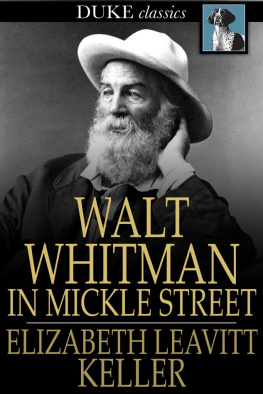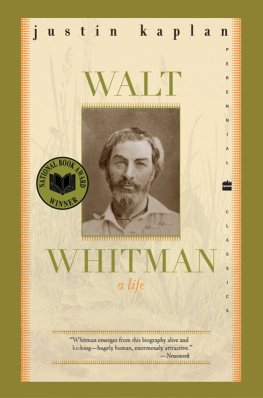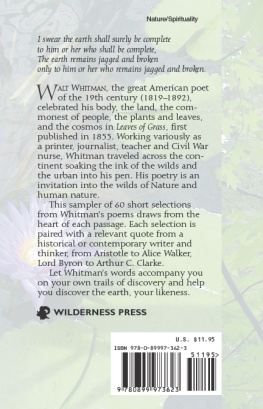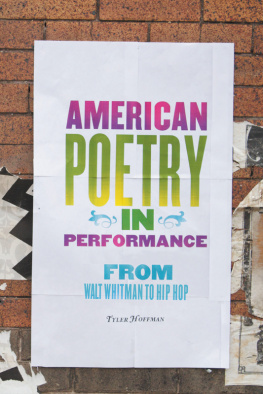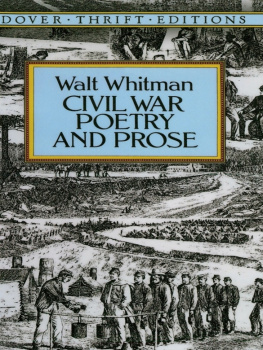WALT WHITMAN AND THE CULTURE
OF AMERICAN CELEBRITY
DAVID HAVEN BLAKE
Walt Whitman and the Culture of American Celebrity

Published with assistance from the foundation established in memory of Philip Hamilton McMillan of the Class of 1894, Yale College.
Copyright 2006 by Yale University.
All rights reserved.
This book may not be reproduced, in whole or in part, including illustrations, in any form (beyond that copying permitted by Sections 107 and 108 of the U.S. Copyright Law and except by reviewers for the public press), without written permission from the publishers.
Set in Scala by Keystone Typesetting, Inc.
Printed in the United States of America.
Library of Congress Cataloging-in-Publication Data
Blake, David Haven.
Walt Whitman and the culture of American celebrity / David Haven Blake.
p. cm.
Includes bibliographical references (p.) and index.
ISBN-13: 978-0-300-11017-3 (alk. paper)
ISBN-10: 0-300-11017-0 (alk. paper)
1. Whitman, Walt, 18191892. 2. Poets, American19th centuryBiography. 3. Publicity. 4. FameEconomic aspects. 5. Popular cultureUnited StatesHistory19th century. I. Title.
PS3231.B58 2006
811%.3dc22
2006009075
A catalogue record for this book is available from the British Library.
The paper in this book meets the guidelines for permanence and durability of the Committee on Production Guidelines for Book Longevity of the Council on Library Resources.
10 9 8 7 6 5 4 3 2 1
GREAT JONES STREET by Don DeLillo
Copyright 1973 by Don DeLillo
Reprinted by permission of the Wallace Literary Agency, Inc.
For Eben, Eva, and Julie
Fame requires every kind of excess. I mean true fame, a devouring neon, not the somber renown of waning statesmen or chinless kings. I mean long journeys across gray space. I mean danger, the edge of every void, the circumstance of one man imparting an erotic terror to the dreams of the republic.
Don DeLillo, Great Jones Street
CONTENTS
PREFACE
Long before Walt Whitman wrote Leaves of Grass, poets had addressed themselves to fame. Horace, Petrarch, Shakespeare, Milton, and Keats all hoped that poetic greatness would grant them a kind of earthly immortality. Whitman held a similar faith that for centuries the world would value his poems. But to this ancient desire to live forever on the page, he added a new sense of fame. Readers would not simply attend to the poets work, they would be attracted to the magnificence of his personality. They would see in his poems a vibrant cultural performance, an individual springing from the book with tremendous charisma and appeal. Out of the political rallies and electoral parades that marked Jacksonian America, Whitman defined poetic fame in relation to the crowd. Others might court the muses on Mt. Parnassus or imagine themselves in the laureates sacred grove. Whitmans poet sought the approval of his contemporaries. In the turbulence of American democracy, fame would be contingent on celebrity, on the degree to which the people exulted in the poet and his work.
This book tells the story of how an obscure Brooklyn poet, better known for his political journalism than verse, immersed himself in the culture of celebrity that was then emerging in the United States. Hoping to redress the mounting divisions in his country, he declared that the poet would become the center of American civic life, that he would command more power and sway than the political representatives he expected to supersede. As Whitman imagined it, the story of celebrity would be the story of democracy. He hoped that the nations narrow political institutions would undergo an extraordinary transformation once they encountered the populist power embodied in the poets fame.
Whitman would have to wait a long time for his celebrity to appear, and even then, it came not in the overflow of spontaneous affection he had envisioned as a younger man but in the respect and admiration expressed by his fellow dignitaries. Uncomfortable with the magnetic, sexual rebel depicted in the first editions of Leaves of Grass, the culture finally accepted Whitman as a majestic, grandfatherly poet, a patriotic wound dresser with his long white beard. But this book is not a study of Whitmans reputation, of how he was eventually accepted into the canon and became the complex national icon that he is today. I am interested in how Whitmans ideas of celebrity helped shape Leaves of Grass, how the meanings he granted to fame influenced the relationship he established with his readers. Sketched out in his notebooks, advertisements, conversations, and poetry, Whitmans celebrity was as much a form of advance publicity as it was a biographical achievement.
The fact that Whitmans fame was largely imagined makes his case more distinctive and revealing than those of the many entertainers and athletes who have achieved stardom since the poets death in 1892. Neal Gabler has suggested that, as an art form wrought in the medium of life, celebrity is primarily narrative in orientation. One of my goals in this book is to reflect on the lyric components of fame, the fleeting, sometimes fantastical moments and gestures that bear the imprint of celebrity culture even when divorced from celebrity stature itself. I use the word lyric regretfully, cringing at the too-clever allusion it implies to Leaves of Grass, but the word can help us recognize these components outside the dramas of narrative and biography. Contemporary life is filled with such lyric expressions of celebrity: the six-year-old who dons a pair of sunglasses and poses like a movie star, the middle-aged accountant who struts like a rock n roll icon during karaoke night at the local pub. Although he would frown at the high incidence of mimicry, I suspect that were he alive today, Whitman would recognize in such gestures the desire for personality that permeates Leaves of Grass.
I began this book after observing how frequently Whitman teaches us what we should value in his poems. Leaves of Grass struck me as being particularly interesting in this regard, for so much of the poetry seemed dedicated to proclaiming its cultural relevance. I wondered whether Whitman had coaxed us into believing that the things he said about himself were true. I give the sign of democracy, he announced in Song of Myself, and in the classes I had attended and the books I had read, democracy was precisely the yardstick by which he was measured, the rubric through which he was understood (LG 1855, 48). (This book is no exception.) Whitman, to my mind, was the Muhammad Ali of American literature, the man whose bombast and epithets were so overwhelming that they had gloriously taken root. Whitmans capacity to fuse poetry with advertisement first led me to investigate his engagement with celebrity.
In researching this topic, I became increasingly aware of the strong presence of Whitmans contemporaries. What I had been observing in Whitman was not simply a personal predilection; it was a window into the growth of celebrity culture in the United States. My original intention was to compare Whitmans treatment of fame to that of such writers as Ezra Pound, Gertrude Stein, Anne Sexton, and Allen Ginsberg, but the more I read about antebellum New York, the more these voices receded into the background, where they await another book. The Whitman this work explores is the poet who was immersed in the life of his times, immersed in the actors, lecturers, publishers, showmen, novelists, and poets who helped define celebrity culture in the United States. To borrow a phrase from Song of Myself, Whitman was both in and out of the game, at once alert to the pressing crowd and alert to posterity. The result was a book of poems that viewed the celebrity of poets as integral to a visionary democracy.
Next page

